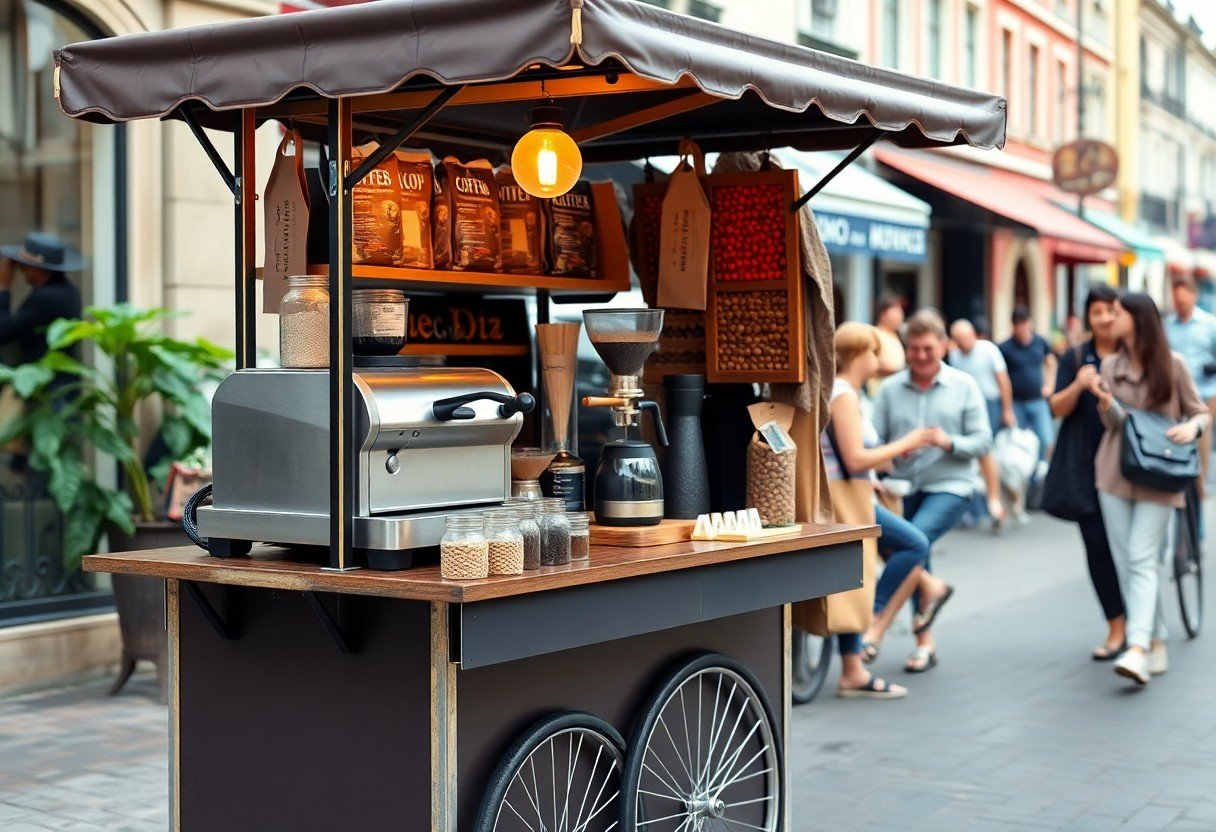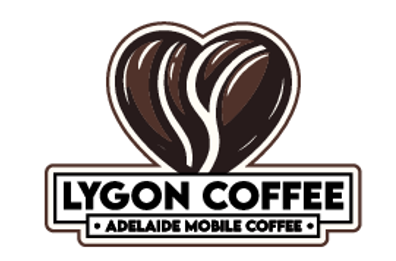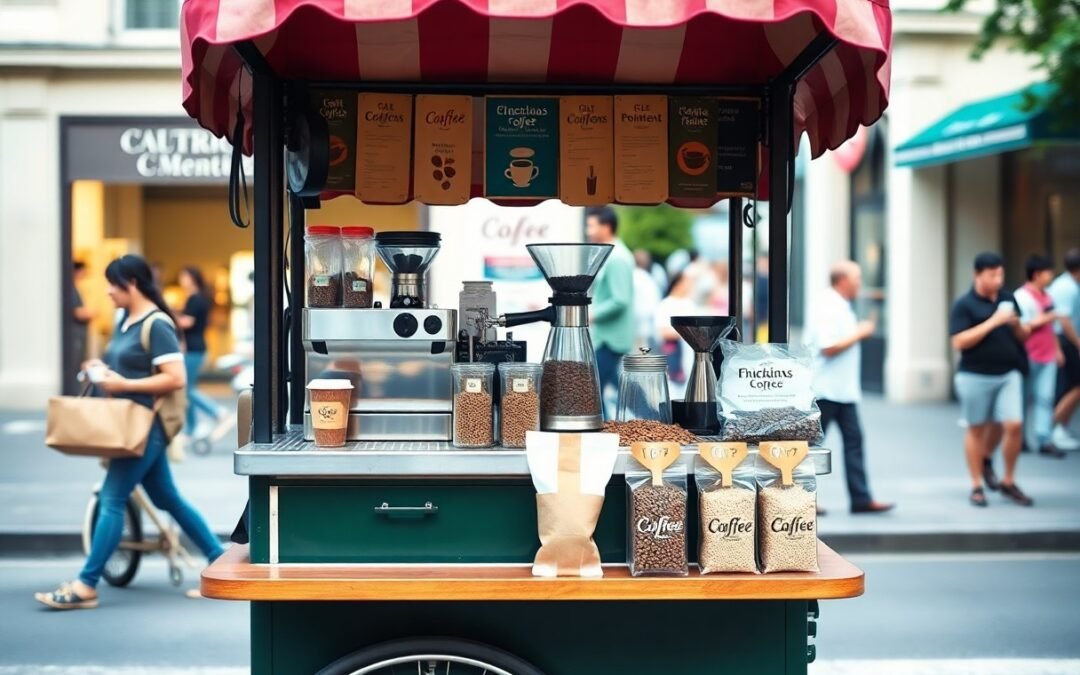Business opportunities abound in the coffee industry, and starting a mobile coffee business allows you to tap into this lucrative market with flexibility and creativity. In this guide, you will learn the vital steps to launch your venture, from selecting the right equipment and sourcing quality beans to marketing your brand effectively. By following these proven strategies, you can set yourself up for success and create a thriving mobile coffee experience for your customers.
Crafting Your Unique Coffee Concept
Developing a distinctive coffee concept sets the foundation for your business. Engage your passion for coffee by considering what blends or brewing techniques excite you, and think about the experience you want to create for your customers. Whether you focus on sustainability, exotic flavors, or a specific brewing method, make sure your concept reflects both your personality and market demand to attract a loyal customer base.
Identifying Your Niche in the Coffee Market
Your niche defines your target market and unique selling proposition. Research local preferences and gaps in the coffee scene to find opportunities. Maybe there’s a demand for organic, fair-trade options or artisan methods like pour-over. By focusing on underserved segments, you can build a dedicated clientele eager for something fresh and different.
Designing a Standout Brand Identity
Your brand identity establishes how customers perceive your coffee business. Prioritize visual elements such as a memorable logo, cohesive color palette, and typography that aligns with your concept. These components should resonate with your target audience and reflect your brand’s values. A strong identity aids recognition, building customer trust and loyalty over time.
Delve into the essence of your brand by creating a story that connects with your audience emotionally. Consider the inspiration behind your coffee concept and how it aligns with your values—this narrative shapes customer perception and loyalty. Design your packaging and marketing materials to harmonize with your identity, ensuring consistency across all platforms. Engage with potential customers through social media, using visuals and stories that encapsulate your unique offerings and ethos, making your brand memorable and relatable.
Navigating Regulations and Permits
Starting a mobile coffee business requires a solid grasp of local regulations and permits to operate legally and efficiently. Compliance with health codes, safety regulations, and zoning laws is crucial to avoid fines and ensure public trust in your venture. Research your area’s specific requirements and take proactive steps to ensure all necessary approvals are obtained before hitting the road.
Understanding Local Health and Safety Regulations
Your mobile coffee business must adhere to stringent health and safety regulations set by local authorities. These may include guidelines on food handling, equipment sanitation, and employee hygiene. Familiarizing yourself with the health department’s standards will help you operate safely and maintain your customers’ trust.
Securing Required Licenses and Certifications
Obtaining the right licenses and certifications will formalize your mobile coffee business. You typically need a business license, a health permit, and potentially a food handler’s permit. Additionally, some regions require a food truck permit or a peddler’s license if you plan to operate in public spaces.
Research your local government’s website for specific licensing requirements, as these can vary dramatically. For example, some areas may require you to pass a food safety course before securing a health permit, while others may have a simpler process. Additionally, consider your state’s Department of Agriculture or health department for guidance on food service regulations. Gathering these permits may take time, often several weeks to months, so initiating this process early can save headaches later on.

Investing in Essential Equipment
Your mobile coffee business relies heavily on the right equipment to deliver quality beverages quickly and efficiently. Start with a high-quality espresso machine, grinder, and a reliable brewing system tailored to your menu offerings. Don’t overlook a portable generator or battery system to ensure you can operate in any location. A well-designed cart or truck that reflects your brand will also enhance your customer experience. Invest in equipment that allows for versatility, enabling you to adapt your setup for various events and locations.
Choosing the Right Mobile Setup for Your Business
Selecting the right mobile setup involves balancing functionality, mobility, and aesthetics. Whether you opt for a coffee cart or a fully outfitted vehicle, ensure it’s easy to transport and set up in different locations. Consider factors like space for equipment, storage for supplies, and the overall customer experience. Your setup should not only accommodate your needs but also attract customers with an appealing design that reflects your brand identity.
Selecting Quality Coffee and Product Supplies
The quality of your coffee and supplies significantly impacts your business’s reputation. Source beans from reputable suppliers who prioritize freshness, sustainability, and flavor profiles that align with your target market. Experiment with various roasters and blends to differentiate your offerings. Additionally, invest in quality milk, syrups, and flavoring options that complement your coffee creations, ensuring every cup upholds your brand’s standard.
Opting for specialty coffee beans that undergo rigorous quality control can set your business apart. Research local roasters who offer direct trade or single-origin options for unique flavor profiles. For instance, sourcing beans from a top-rated Colombian or Ethiopian roaster can captivate your customers with distinctive taste experiences. Pair your coffee with organic milk or alternative options like oat or almond milk, and consider adding a selection of craft syrups or unique flavorings, as consumers increasingly seek diverse and customizable beverage choices. Building strong relationships with your suppliers ensures you maintain quality and receive fresh products consistently.
Crafting an Effective Business Plan
A well-structured business plan serves as the roadmap for your mobile coffee venture, outlining your vision, operational strategies, and financial forecasts. It should cover aspects such as company description, market analysis, organizational structure, marketing approach, and financial projections. This document will not only guide your decision-making but also attract investors or lenders who need assurance of your business’s viability and profitability.
Defining Your Target Market and Marketing Strategies
Identifying your target market is vital for tailoring your offerings and marketing efforts. Analyze demographics in your operating area, such as age, income level, and coffee preferences. Consider utilizing social media platforms and local events to promote your brand. Word-of-mouth and loyalty programs drive engagement, while local partnerships can enhance visibility and customer attraction.
Setting Realistic Financial Projections and Goals
Your financial projections should encompass startup costs, operational expenses, and revenue forecasts. Establish specific, measurable goals based on thorough market research and historical data from similar businesses. Adjust these projections as needed to ensure they reflect reality, guiding your financial decisions effectively.
Include fixed and variable costs in your financial planning, like the purchase of equipment, ongoing supplies, and staff wages. Estimate daily sales based on local foot traffic, possible events, and seasonal variations, aiming for a detailed break-even analysis. Having realistic financial expectations allows you to adapt your strategy and ensures sustainability, which is necessary for long-term success. Additionally, consider creating a buffer for unforeseen expenses, as these can significantly impact your cash flow and operational stability.
Building a Customer-Centric Experience
Creating a customer-centric experience involves understanding your clientele’s preferences and delivering exceptional service consistently. Focus on building genuine relationships, encouraging feedback, and personalizing interactions. Your goal is not just to serve coffee but to create an inviting atmosphere that makes customers feel valued and connected to your brand. Implementing comfortable seating areas, loyalty rewards, and engaging social media presence can enhance this experience, fostering a community around your mobile coffee venture.
Mastering Customer Interaction and Engagement
Effective customer interaction hinges on active listening and responsiveness. Engage customers by remembering their names and favorite orders, creating a personalized touch that sets you apart from competitors. Use social media platforms to share updates, run promotions, and respond to inquiries, allowing you to build a dialogue and strengthen community ties. Encouraging customers to share their experiences online can amplify your reach and establish a loyal following.
Implementing Loyalty Programs and Community Outreach
Establishing loyalty programs incentivizes repeat business while community outreach fosters strong local ties. By offering rewards, such as discounts for frequent customers or free drinks after a certain number of purchases, you encourage loyalty. Additionally, participating in local events or collaborating with nearby businesses not only enhances visibility but also builds a sense of community. These efforts can lead to new customers discovering your service while reinforcing existing relationships, making your brand a staple in the area.
Effective loyalty programs can take various forms, such as punch cards, mobile apps, or points systems that reward customers with free items or exclusive deals. Engaging in community outreach, like sponsoring local events or offering free coffee during charity drives, can draw in new patrons while showcasing your commitment to local welfare. Regularly assessing customer feedback helps in tailoring these programs to experience greater success, ensuring that your strategies resonate well with your target audience and highlight your business as a beloved community cornerstone.
Final Words
Presently, starting a successful mobile coffee business from scratch requires a combination of research, planning, and execution. You should craft a unique value proposition to stand out, secure the necessary permits, and design an appealing brand. Efficiently managing your supply chain and focusing on quality will keep customers coming back. Always engage with your community to build relationships and gather feedback. By taking these steps, you position yourself for sustainable growth and success in the competitive coffee market.
FAQ
Q: What are the initial steps to start a mobile coffee business?
A: Begin by researching the coffee industry and market trends. Create a business plan outlining your concept, target market, and budget. Obtain necessary permits and licenses, and choose a suitable vehicle for your coffee business.
Q: How do I choose the best location for my mobile coffee business?
A: Identify high-traffic areas such as parks, business districts, or events. Consider local demographics and emerging hotspots. Monitor foot traffic patterns and engage with community events to secure spots.
Q: What equipment do I need for a mobile coffee business?
A: Essential equipment includes an espresso machine, coffee grinder, brewing tools, portable water source, and storage for supplies. You may also need a point-of-sale system and mobile cart or vehicle adaptations.
Q: How can I market my mobile coffee business effectively?
A: Utilize social media to engage with customers and promote your location. Offer loyalty programs, collaborate with local events, and create visually appealing signage. Word-of-mouth and flyers can additionally enhance visibility.
Q: What are common challenges faced when starting a mobile coffee business?
A: Common challenges include securing permits, managing operating costs, maintaining quality during service, and handling competition. Adaptability to customer preferences and local regulations is vital for success.

